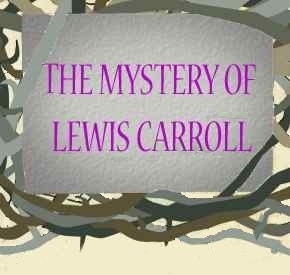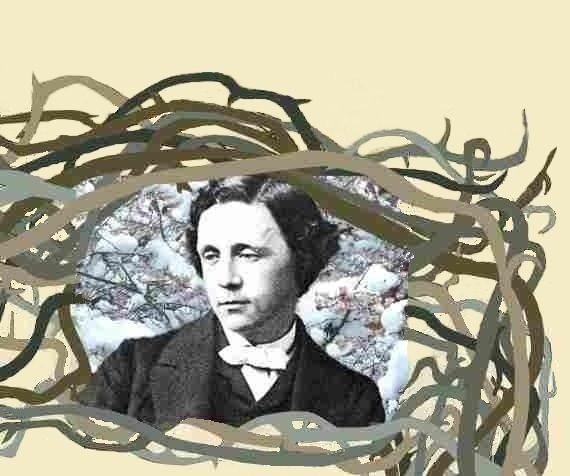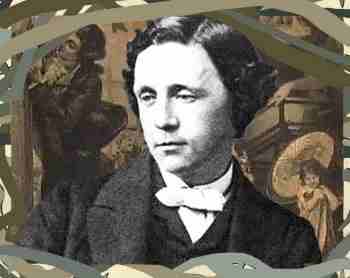Latest Information
Comments and Controversies
Lewis Carroll was no stranger to controversy even in his own lifetime - although his love of children was never part of the problem. Now, though, times have changed, and modern attitudes and preoccupations are very different indeed from those which held sway when Carroll was alive.
Accordingly, I occasionally get correspondence from people who believe that Carroll was a paedophile or closet paedophile..
Because I don't think he was a paedophile I don't like dwelling on the subject in connection with him. But I occasionally do bring it up, because so many assertions are confidently and wrongly made, and occasionally they need to be dealt with. I received an email recently which has given the opportunity to look at this. I hope the writer won't mind my quoting some relevant bits of his email and replying to it here.
He says that "His (Carroll's) actions - getting involved in charitable work concerning children, secrecy, fascination with pornography, taking nude photos, 'grooming' women and children are quite common characteristics of 'dormant' paedophiles. "
Let me go over the writer's comments one at a time.
First, "Getting involved in charitable work concerning children." Carroll did not get involved in children's charities in person. He donated money through his bank as part of his personal system of giving to many charities that helped a variety of vulnerable individuals, including children, women, the sick and the poor. These charities happened to include one which tracked down and prosecuted paedophiles. We have no record that Carroll discussed any of this charitable giving with anyone, so he was not doing it for show, nor did he participate in any of the charities' practical activities, he just donated to their work. .
Second, he was not secretive about his feelings for children or his nude depictions of children. He spoke openly about child nudity and his interest in it, with many people, including the childrens' parents. He believed that if people concealed parts of the human body, it suggested that they saw something wrong about it, so he preferred either draped or undraped figures to partially draped ones. He saw children's nudity as God's handiwork in its purest and godliest form. It is a view that is unfashionable now, but it was appropriate to his own culture.
Third, he was not fascinated by pornography, as the writer of the letter states. In fact, not only is there no evidence for this assertion, but he is on record as saying he disapproved of pornography. There are also private writings which show that he disapproved of commercial exploitation of sex and thought badly of men who indulged in it. After his unexpected death his deeply religious family cleared his rooms. They then went on to emphasise his love of children in two whole chapters of a biography - something they would never have done had they found anything abnormal or indecent relating to children in his most personal papers or books.
Fourth, he did take nude photos, which he and many others of his period saw as art. Children were considered to be nonsexual, and attitudes to nude photographs of children have changed. It is not realistic to project modern ideas so far into the past. However, a persistent question mark does hang over a different aspect of Carroll's photography, and my belief is that this relates to his photographs of women in gymnastic or swimming attire later in life, and his friendliness with women generally as he grew older. We would think nothing of this, but in his time, it was considered problematical behaviour in an unmarried man. His lady friends all seemed to find him supportive, enabling and kind, but perhaps more research needs to be done into this aspect of his photography.
Children who left recollections of Lewis Carroll - including some of those whom he photographed nude - had extremely affectionate and positive memories of his gentle kindness, and some specifically said he gave them a feeling of self worth and personal value which stayed with them all their lives. He took children's feelings and thoughts seriously (most unusual at the time, when they were supposed to be "seen and not heard"). Even the children who didn't care for him (and there were some) tended to find him boring, soppy or babyish with his puzzles and stories. It is not reasonable to look back to this long gone time and describe this gentle kindness, valued by so many, as "grooming." Carroll himself said that spending time with little children, specially girls, relieved his mental stress, and his nephew said that it lifted the depression that often afflicted him. He sometimes wished he was still a young child, free of the depressing preoccupations and sins of adult life.
Carroll lived in a time when general attitudes towards sex were very different from our own. Certain views commonly held in those days seem stupid, misguided or even repugnant to us. It was not considered wrong for grown men to fall in love with fairly young teenagers, so long as the relationship was kept chaste until the pair were of an age to marry. (Indeed, Edward Benson, who became Archbishop of Canterbury, fell in love with his wife-to-be when she was twelve and he was in his twenties; they later married and had several distinguished children.) It was considered that women had something wrong about them if they were interested in sex, and the general idea that even sex in marriage was something you should not like and might do you physical harm. Sex was a subject which was simply not discussed in public, and shame played a large part in this view. Not surprisingly, a huge underworld grew up, of which the Church and "decent people" strongly disapproved. Carroll expected celibacy of himself and believed this is what God wanted for him. I myself think this might well have given him some hang ups, but there is no suggestion at all that abusing children was any part of his solution.
I am not trying to be critical of the person who wrote to me. He said he was writing a book on paedophilia and was understandably concerned with signs and symptoms of the modern paedophile. But his note is a very good example of how people have pinned - and continue to pin - their personal preoccupations on historical figures, and this is something which should be done with very great caution.





